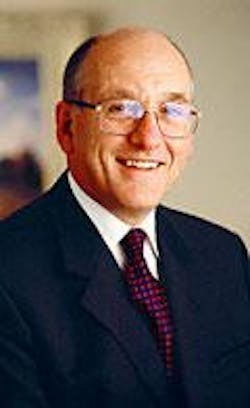Shell continues to press support for sustainability research
Royal Dutch/Shell Group continues to press its campaign to support research on sustainability issues.
And the firm's chairman, Philip Watts, insists those efforts constitute smart business strategy, not philanthropy.
In July Shell paid the first $500,000 installment of the company's $3.5 million endowment to establish an interdisciplinary Shell Center for Sustainability at Rice University in Houston.
The center is to be a hub for collaboration by a variety of academic, industry, and government experts addressing a wide range of economic, societal, and environmental issues through the application of technology, market-based incentives, and other initiatives.
Society's challenges
"Society faces tremendous challenges due to population growth, the growing chasm between the poor and wealthy, damage to the environment, climate change and loss of biodiversity, frankly unsustainable levels of consumption of resources, and issues related to health and education," said Watts, who also chairs the World Council for Sustainable Development.
"We at ShellUhave a relevant role to play in helping address the three fundamental challenges facing society: raising living standards throughout the developing world, meeting the increasing demand for energy this requires, and safeguarding our planet for future generations," he said. "The center will be a forum for learning and exchanging ideas in an open, transparent environment."
However, Watts emphasized, "Sustainable development is not philanthropy. Sustainable development does not equate to (alternative energy) renewables. Sustainability is a mindset about how we do our business today."
Malcom Gillis, president of Rice and a member of the National Academy of Sciences Board on Sustainable Development, said, "The Shell Center is the first substantial program anywhere to mount and coordinate research on sustainability across science, engineering, management, public policy, and the humanities, involving fields ranging from nanotechnology through economics, ethics, and management. The best guarantee for the welfare of this and future generations is, in fact, successful sustainable development, wherein cleaner air and water are not viewed as something apart from rising incomes, but part and parcel of the same."
Sustainability 'good business'
Shell has been quicker than most major international oil companies to embrace nettlesome environmental issues such as climate change through its sustainable development program because, said corporate executives, it is a good business move.
"In 1998, we made a commitment that we would reduce our greenhouse gas emissions from the 1990 level by 10% by 2002," said Watts. The company expects to meet that goal by yearend, he said. "Now if we had carried on business as usual, our emissions would have gone up by 30%. So instead of a 30% increase, we have a 10% absolute reduction in greenhouse gas emissions. But that's not all. Most of those emissions were profitable to reduce."
Watts also cited Shell's development of the Athabasca oil sands in Alberta as another example where a "holistic" approach has proven to be good business. "We decided that, before funding the whole project, we would look at the totality of it and see if we could justify it against our sustainable development principles. We found that, through the efficiency of the total process, we could demonstrate that it was better than imported crude oil," he said. "Most of the reductions of emissions were done by investments that were in themselves profitable. The idea of sustainable development principles really does work."
Sustainability scenarios
The principles of sustainable development employed by Shell grew in part from its practice of scenario development, in which it looks at various possible economic, business, environmental, and political changes to assess their probable impacts on the company and its best potential reaction—"something Shell has long been noted for," said Steven L. Miller, chairman, president, and CEO of Shell Oil Co., Houston.
"As you study those scenarios over a number of years as we have done, you become sensitive to the differences around the world and the growing gap between supply and demand," Miller said. "When you think about taking some of those scenarios out 20, 30, 50 years, you become increasingly concerned about how the next generation and the generation after that will be able to build upon the platforms that we have."
Watts sees two basic elements to corporate employment of the principles of sustainable development. "One is captured in the classic statement of the sustainable behavior of business today, with your children and grandchildren, the next generations, in mind. This is the philosophical, almost moral, line of argument," he said.
But in addition, Watts said, "What we found over the last 5 years is that there is also the hardnosed business aspect. For instance, if you want to mitigate risk in business, it sure helps to know who your neighbors are and have a good dialogue with them about what should I be doing in cleaning the air."
Adhering to such principles can help a company better anticipate future problems in a marketplace and to protect "your reputation, in terms of finding that balance (among) economic, environmental, social" issues, he said.
Moreover, Watts said, "If you want to attract today the brightest and best young people into your organization, if you as leaders in business can't tell a good story on the issue of sustainable development, you don't get off to a good start."
Shell-Rice connection
Miller, who is also a member of Rice University's board of trustees, said, "Shell and Rice share many things in common, from our commitment to education to finding solutions to environmental and social problems, developing new technology and business models, and then sharing that knowledge so that America and indeed the world communities have the opportunity to grow and to advance."
Shell plans to give Rice $1 million/year over the next 3 years to help fund the new center. Meanwhile, Gillis said he is talking with other firms about providing additional funding. He said an individual with another energy company in Houston plans to endow a chair at the center. Gillis did not identify the potential donors, however.
Energy company role
While endorsing environmental and sustainability issues, Watts makes no apologies for being an oil man. "The reality is that there is no development without energy, so I don't feel at all badly about being in the energy business," he said. " I do think there is an issue for all developed countries about the intensity of energy use, about how we get the most out of the energy we use."
Watts said, "I think one thing that helps in terms of relationships with our critics is a willingness by business to be more and more transparent, to describe the way we do our business, publish reports, and get those reports in the hands of the public. That helps the level of trust. It's also important that we also have a relationship with young people in this process. That's why I'm particularly thrilled with this effort with Rice."
"If you want to attract today the brightest and best young people into your organization, if you as leaders in business can't tell a good story on the issue of sustainable development, you don't get off to a good start."

